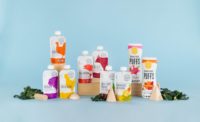Free At Last
By Dan Malovany
As it enters the U.S. market, Hollandia Bakeries Ltd. of Canada creates a point of differentiation from its competitors by developing cookies that are trans fat- and palm oil-free and produced in a peanut-free environment.
Hollandia Bakeries is making inroads in the Canadian and U.S. markets by making its products free. No, it’s not giving them away. Rather, the products are free of many of the ingredients today’s health-conscious consumers are trying to avoid.
“Our niche and the reason that we have been successful is that our products are ‘free’ [as in peanut-free and trans fat-free] and positioned as more healthy snacks,” says Joop De Voest, Jr., who is president of the family operation founded by his grandfather in 1954.
Twenty years ago, for instance, the Mt. Brydges, Ontario-based company reformulated its cookies to eliminate palm and other tropical oils. Then, in the early 1990s, Hollandia cut the fat out of its products, but only for a short period of time before that craze diminished, De Voest notes. The company still produces sugar-free cookies, which debuted in the late 1990s.
But that’s only the beginning. About seven years ago, the idea of peanut-free products emerged as a huge issue in Canada after some young students experienced allergic reactions to products containing them. In fact, the Canadian government has since mandated that schools need to have an action plan in place for anaphylactic shock.
Seeing the opportunity to broaden its presence in the school lunch market, De Voest and other Hollandia representatives started approaching school boards to tell them they operated a nut-free facility. The company wasn’t only peanut-free; its plant also did not store nuts of any kind — no peanut oil and no snack nuts or candy bars with nuts in its vending machines. Even employees can’t bring peanut butter sandwiches to work.
“For many schools, the products now have to be peanut-free. That was the whole dilemma here,” explains Doug Smith, Hollandia’s sales manager. “We decided that we’re not only going to be peanut-free, but also free of any kind of nuts. Kids can take our products to school because we’re a nut-free operation.”
Perhaps the greatest challenge involved reformulating Hollandia’s cookies so that they were trans fat-free. Although some of its competitors beat Hollandia to market with trans fat-free varieties, they did it mostly by blending non-shortening or oils with palm oil or other tropical oils that contain saturated fats. De Voest, a fourth-generation baker whose family emigrated from the Netherlands, thought that reverting to tropical oils was not the right solution for his company.
“There are two ways to go trans fat-free — the easy way and the hard way,” he says. “My focus was that there was a need to make that step to trans fat-free, but not take a step backwards using palm oil.”
For two years, the company had searched for a solution, but there weren’t a lot of options available for going both trans fat-free and palm oil-free.
“There were not many suppliers out there who could make a trans fat-free product that we could just substitute one-for-one,” De Voest says. “We presently don’t work with oils. Eventually we will, but I wanted to make a transition from the shortening we are presently using to a trans fat-free and palm oil-free shortening.”
Eventually, ingredient technology advanced, and De Voest saw a trade magazine ad for a shortening that met his requirements. Working with that supplier, Hollandia’s bakers have reformulated its line of 40 varieties of hard and soft cookies and started making the changeover one product at a time to trans fat- and palm oil-free in the fall.
“We actually perceive that we have a better-eating cookie with a nicer color by using trans fat-free and palm-free shortening,” De Voest says. “My whole philosophy is that I want to make it right the first time, and to do it without any change for the consumer. When they eat Hollandia cookies, it will be the same as they had the last time.”
Land of the Free
The timing couldn’t be better. Health Canada, the government’s health department, is requiring most pre-packaged foods to list trans fats by mid-December. Moreover, a survey conducted in September by the Leger Marketing group indicated that 62% of Canadians have made changes to their diet to eliminate trans fats. More than half of the 1,500 consumers surveyed said they would stop eating their favorite treats if they contained trans fats.
In the United States — a potential growth market targeted by Hollandia — mandatory trans fat labeling begins on January 1, 2006, although some companies may apply for an extension from the Food and Drug Administration. Even so, many retailers, schools and even some foodservice chains are asking cookie producers to reformulate their products to get rid of trans fats. Many companies such as Frito-Lay, Pepperidge Farm and Kraft Foods already have done so to most, if not all, of their baked goods.
In Canada, the company’s Hollandia branded and private label cookies can be found in traditional supermarkets, convenience stores, dollar stores, fundraisers and some mass merchandisers. To facilitate growth in the United States, the cookie producer is initially targeting dollar stores and private label channels, but it also plans to grow in supermarkets, C-stores and other retail outlets.
To facilitate its expansion, the company has moved into tear-away instant display cases for stores that have limited shelf space and want to offer a pallet of cookies, says Wayne McLaughlin, a broker who oversees U.S. and other international sales. Hollandia cookies also are shipped via cargo container to the Caribbean and other areas, but he sees bigger potential in the states.
“The dollar store business in the United States is so much stronger than in Canada,” McLaughlin notes. “Canada is disjointed. It’s a DSD [direct-store delivery] business. A lot of companies carry their accounts by store. In the U.S., the dollar chains are more sophisticated in terms of their warehouse distribution. They have depots across the country that service their stores. We know they will handle the integrity of our product and handle it quickly.”
For the U.S. market and especially the dollar store channel, Hollandia has developed the Karleen’s brand, named after De Voest’s youngest daughter.
“Karleen’s is positioned more for the dollar store market where it’s a smaller package, but at the same time, the same varieties of cookies,” McLaughlin says. “There are a lot of markets in the U.S. that are looking for the 99 cent or just over $1 market. Hollandia is the premium brand name that has been around for 50 years.”
Every Shape and Size
Initially, a Dutch bakery that produced a variety of pastries, cookies and breads, the company eventually began focusing on wholesale production of cookies when it built its 35,000-sq-ft. plant in 1970.
Hollandia’s top-selling products are fruit turnovers, which are soft cookies with raspberry or strawberry filling on top. Apple, cherry and date varieties also are popular.
“Our turnovers have an abundance of fruit filling, and that’s what sets us apart from others,” Smith says. “It’s our signature product. We’ve been doing them for 50 years.”
Additionally, Hollandia’s popular products include mini-button cookies, Grandma’s sugar cookies and Speculaas windmill cookies. It produces four styles of chocolate chip cookies, ranging from a new, indulgent premium butter chocolate chip item to more economical wirecut varieties. The company does not make sandwich, wafer or enrobed cookies.
Packages come in all types of sizes, ranging from a popular 7.9-oz. overwrapped tray of turnovers and 14.1-oz. roll packs of hard cookies to form/fill/seal bags and even a square tub that’s recyclable, microwaveable, resealable and filled with 14 oz. of bite-sized cookies. The company thinks the tubs are more environmentally friendly than the use-and-toss varieties.
“The nice thing about the tubs is that you can stack them 10-high, and they won’t fall down,” McLaughlin says.
Hollandia also cranks out traditional bagged and boxed products and tin-ties, which are rectangle boxes with a gabled top and a strip of tin near the top that can be rolled over to reseal the package. In addition, the company has a variety pack with six types of cookies in tray packaging. In Canada, bulk cookies dumped in special displays and sold by the pound also are popular. In addition, responding quickly to customer requests is the cookie producer’s forte.
“The biggest advantage with Hollandia is that we work closely with our customers to develop unique and different products and in different types of packages,” Smith says.
Focus on Quality
Approximately 60 employees work on two shifts for 18 hours five days a week in the narrow plant, which is about 600-ft. long and not more than 100-ft. wide in parts. Two 80,000-lb. silos feed two 2,900-gallon mixers with flour, and another 80,000-lb. silo provides granulated sugar. Shortening, chocolate chips and other minor ingredients are added by hand, although the facilities use 1,850- to 2,200-lb. totes for molasses and other liquid ingredients.
The plant houses two lines, one with a 100-ft. gas-fired tunnel oven that cranks out 1,500 lb. of product an hour, De Voest says, and “the big cookie line” with a 150-ft. tunnel oven that produces 2,000 lb. of cookies an hour. Typically, the smaller line produces products for bulk or boxed cookies, while the main line bakes 800 cookies a minute for the company’s popular tray and roll packs. Both lines can produce wirecut or rotary cookies.
During SF&WB’s visit, the main line was making 10 wirecut turnovers at a time on the 39-in. wide line. After passing under a roller that flattened and rounded the pieces, a dollop of cherry fruit filling was added.
Following baking and cooling, the cookies entered the versatile packaging area, which houses three packaging lines. On the most automated line, which produces 75 trays of cookies per minute, the turnovers first passed through metal detection before being stacked and manually loaded into trays that traveled down a single-lane conveyor.
After overwrapping, the packages were checkweighed and passed through a second metal detector before being cartoned and palletized. All pallets then were shrink-wrapped automatically before heading to the facility’s warehouse.
The plant has a quality assurance laboratory that checks pH balance, conducts moisture tests, inspects incoming materials, oversees new product development and provides shelf life assurance. The shelf life for Hollandia’s soft cookies such as its turnovers is 13 weeks, with its hard cookies having a slightly longer shelf life of 20 weeks. Packages contain both the date on which the products were produced and the date by which the products should be consumed.
In the future, Hollandia plans to step up its new product innovation, especially after it completes its rollout of trans fat-free products. New packaging and shelf talkers will promote the fact that the cookies don’t contain trans fats or palm oils.
Although expanding into the United States with new products will fuel the $10 million (CAD) company’s growth, De Voest wants to expand at a measured pace with a diversified client base.
“I’ve never been one who wants to grow very fast because you might lose control,” he says. “I think we have a nice bakery that has lots of potential, and we can make a variety of different products for good growth in the U.S. market.” SF&WB
At a Glance
Company: Hollandia Bakeries Ltd.
Location: Mt. Brydges, Ontario
Plant Size: 35,000 sq. ft.
No. of Employees: 60
Sales: About $10 million CAD
Products: 40 varieties of hard and soft cookies, windmill cookies, turnovers.
Brands: Hollandia, Karleen
Web site: www.hollandiacookies.com
Key Personnel
President: Joop De Voest, Jr.
Sales Manager: Doug Smith
Broker: Wayne McLaughlin


